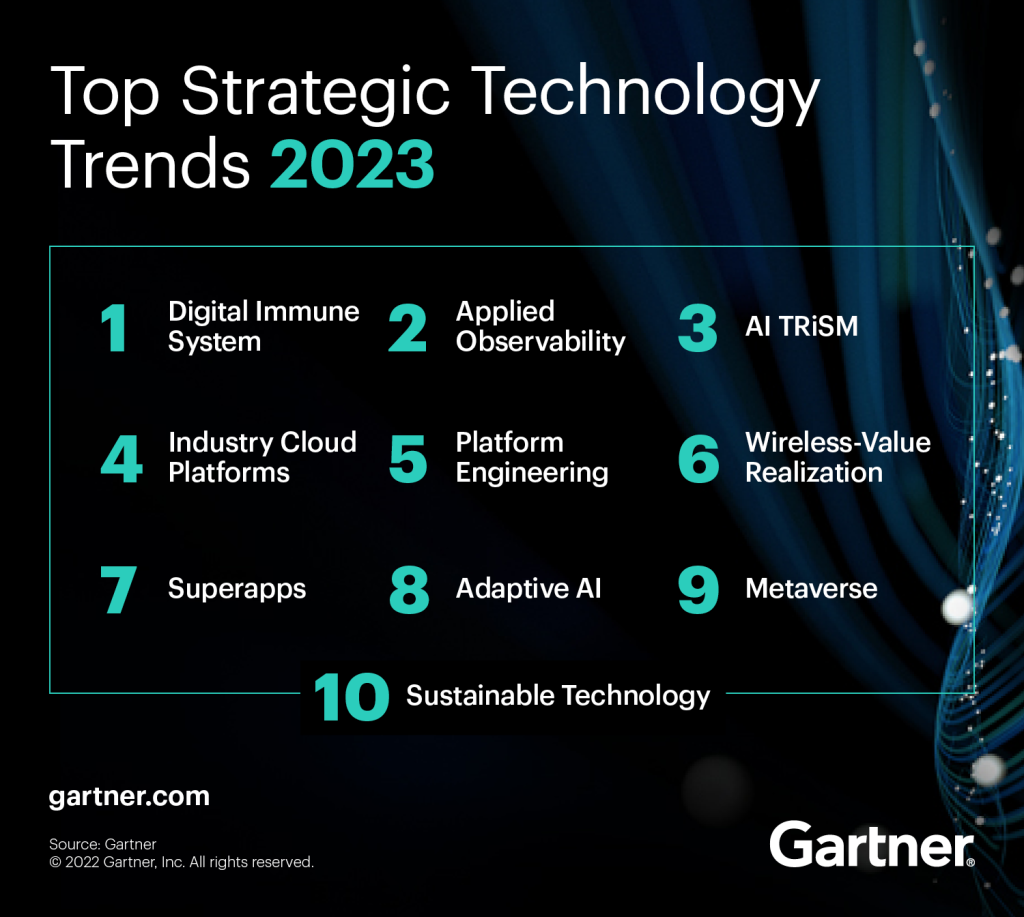Unveiling The Unstoppable Wave: Latest Technology Trends Gartner Reveals – Click For Insights And Actionable Strategies!
The Latest Technology Trends in Gartner: A Comprehensive Overview
Introduction
Hello, Readers! In this article, we will delve into the latest technology trends identified by Gartner, a renowned research and advisory company. Gartner’s insights are highly valued in the tech industry, as they provide valuable guidance for businesses and individuals alike. By staying up-to-date with these trends, you can gain a competitive edge and adapt to the ever-evolving technological landscape. Let’s explore the top technology trends according to Gartner and understand their significance.
2 Picture Gallery: Unveiling The Unstoppable Wave: Latest Technology Trends Gartner Reveals – Click For Insights And Actionable Strategies!


The Table of Latest Technology Trends Gartner
Trend
Description
Artificial Intelligence
AI is revolutionizing various industries with its ability to mimic human intelligence and automate tasks.
Internet of Things
IoT refers to the network of interconnected devices that collect and exchange data, enabling seamless communication and automation.

Image Source: all-electronics.de
Blockchain
Blockchain technology ensures secure and transparent transactions, making it ideal for financial and supply chain industries.
Augmented Reality
AR enhances the real-world environment with computer-generated elements, providing immersive experiences in various sectors.
Edge Computing
Edge computing brings processing closer to the data source, reducing latency and enabling faster and more efficient operations.
Quantum Computing
Quantum computing leverages quantum mechanics to perform complex calculations, offering unprecedented computational power.
What is the Latest Technology Trends Gartner?

Image Source: gcom.cloud
Gartner’s latest technology trends encompass a range of emerging technologies that are poised to disrupt industries and reshape the way we live and work. These trends are identified through extensive research and analysis, providing valuable insights for businesses, IT professionals, and technology enthusiasts.
AI, IoT, blockchain, AR, edge computing, and quantum computing are some of the prominent trends identified by Gartner. Let’s explore each of these trends in detail.
Artificial Intelligence (AI)
AI refers to the simulation of human intelligence in machines that are programmed to think, learn, and problem-solve like humans. This technology is transforming industries such as healthcare, finance, manufacturing, and customer service by automating processes, improving decision-making, and enhancing overall efficiency.
Advantages:
🔹 Increased productivity and efficiency.
🔹 Enhanced accuracy and precision.
🔹 Improved customer experiences.
🔹 Automation of repetitive tasks.
🔹 Data-driven insights for better decision-making.
Disadvantages:
🔸 Ethical concerns regarding job displacement.
🔸 Data privacy and security risks.
🔸 Dependence on accurate data for optimal performance.
🔸 Bias in AI algorithms.
Internet of Things (IoT)
IoT refers to the network of interconnected physical devices that collect and exchange data through embedded sensors, software, and connectivity. This technology enables seamless communication between devices and allows for automated control and monitoring. IoT finds applications in smart homes, healthcare, transportation, and industrial automation.
Advantages:
🔹 Improved efficiency and productivity.
🔹 Enhanced monitoring and control of devices.
🔹 Cost savings through predictive maintenance.
🔹 Real-time data for informed decision-making.
🔹 Improved safety and security measures.
Disadvantages:
🔸 Privacy and security vulnerabilities.
🔸 Compatibility issues and lack of standardization.
🔸 Potential for increased complexity and system failures.
🔸 Data overload and management challenges.
🔸 High implementation and maintenance costs.
Blockchain
Blockchain is a decentralized and distributed ledger technology that ensures secure and transparent transactions. It eliminates the need for intermediaries, making it ideal for industries such as finance, supply chain management, and healthcare. Blockchain’s core features include immutability, transparency, and enhanced security.
Advantages:
🔹 Enhanced security and data integrity.
🔹 Increased transparency and trust.
🔹 Efficient and streamlined processes.
🔹 Reduced costs through elimination of intermediaries.
🔹 Improved traceability and accountability.
Disadvantages:
🔸 Scalability limitations.
🔸 Energy-intensive mining processes.
🔸 Regulatory and legal challenges.
🔸 Lack of common standards.
🔸 Limited understanding and awareness.
Augmented Reality (AR)
AR enhances the real-world environment by overlaying computer-generated elements, such as images, sounds, and videos, providing an interactive and immersive experience. This technology finds applications in gaming, education, healthcare, retail, and manufacturing, enabling users to visualize and interact with virtual objects in the real world.
Advantages:
🔹 Enhanced user experiences.
🔹 Improved training and education.
🔹 Increased productivity and efficiency.
🔹 Enhanced visualization and collaboration.
🔹 Innovative marketing and advertising opportunities.
Disadvantages:
🔸 Hardware limitations and cost.
🔸 Potential for sensory overload.
🔸 Privacy and security concerns.
🔸 Limited content availability.
🔸 Ethical considerations in AR usage.
Edge Computing
Edge computing brings data processing closer to the data source, reducing latency and enabling real-time analysis and decision-making. In edge computing, data is processed at the edge of the network, near the devices generating it, rather than sending it to a centralized cloud server. This technology is particularly beneficial in scenarios with low latency requirements, such as autonomous vehicles, industrial IoT, and remote monitoring.
Advantages:
🔹 Reduced latency and faster response times.
🔹 Bandwidth optimization and cost savings.
🔹 Improved reliability and security.
🔹 Real-time analytics and decision-making.
🔹 Enhanced privacy through local data processing.
Disadvantages:
🔸 Increased complexity in managing distributed infrastructure.
🔸 Limited scalability.
🔸 Dependence on reliable connectivity.
🔸 Higher initial investment and maintenance costs.
🔸 Potential compatibility and interoperability challenges.
Quantum Computing
Quantum computing leverages the principles of quantum mechanics to perform complex calculations at an exponential speed compared to classical computers. This technology has the potential to solve complex problems in fields such as cryptography, optimization, drug discovery, and material science. Quantum computing is still in its early stages but holds immense promise for various industries.
Advantages:
🔹 Rapid and efficient problem-solving.
🔹 Breakthroughs in cryptography and cybersecurity.
🔹 Accelerated drug discovery and materials research.
🔹 Optimization of complex systems.
🔹 Advanced machine learning and AI algorithms.
Disadvantages:
🔸 Technical challenges in building and maintaining quantum computers.
🔸 Limited availability and high costs.
🔸 Susceptibility to errors and noise.
🔸 Need for specialized skills and knowledge.
🔸 Ethical considerations in quantum computing applications.
Conclusion
In conclusion, staying informed about the latest technology trends identified by Gartner is crucial for individuals and businesses seeking to thrive in the digital age. The trends discussed above, including AI, IoT, blockchain, AR, edge computing, and quantum computing, have the potential to transform industries and drive innovation. Embracing these technologies can lead to increased efficiency, improved decision-making, and enhanced customer experiences. It is essential to assess the advantages and disadvantages of each trend and carefully evaluate their applicability to your specific context.
FAQs (Frequently Asked Questions)
1. What industries can benefit from AI?
Various industries, including healthcare, finance, manufacturing, and customer service, can benefit from AI by automating processes, improving decision-making, and enhancing overall efficiency.
2. How does edge computing reduce latency?
Edge computing reduces latency by processing data at the edge of the network, near the devices generating it, rather than sending it to a centralized cloud server. This enables real-time analysis and decision-making.
3. What are the potential applications of blockchain?
Blockchain technology finds applications in finance, supply chain management, healthcare, and other sectors where secure and transparent transactions are critical.
4. How does AR enhance user experiences?
AR enhances user experiences by overlaying computer-generated elements on the real-world environment, providing interactive and immersive experiences in gaming, education, healthcare, retail, and manufacturing.
5. What are the challenges in adopting quantum computing?
The challenges in adopting quantum computing include technical difficulties in building and maintaining quantum computers, limited availability and high costs, susceptibility to errors and noise, and the need for specialized skills and knowledge.
Final Remarks
Keeping up with the latest technology trends, as identified by Gartner, is essential for individuals and businesses aiming to remain competitive in the digital era. It is important to evaluate each trend’s potential benefits and drawbacks and determine how they align with your specific goals and requirements. By embracing these trends strategically, you can harness the power of technology to drive innovation and achieve success in your endeavors. Stay curious, explore new possibilities, and adapt to the evolving technological landscape!
This post topic: Latest Technology Trends

